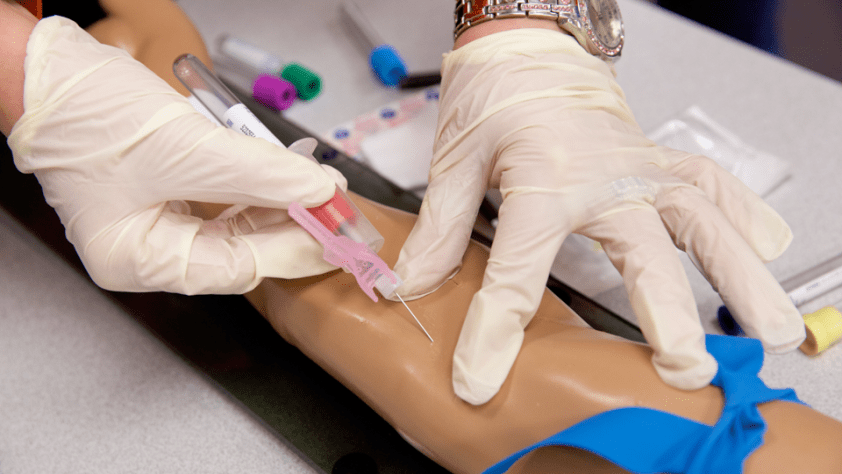Phlebotomy school vs Other Healthcare Paths: Which One Is Right for You?
Phlebotomy school vs Other Healthcare Paths: Which One Is Right for You?
Blog Article
The Path to Certification: Understanding the Phlebotomy Training Training Course Journey and Its Importance
As you think about the course to certification in phlebotomy, it's essential to understand the duty you'll play in medical care. Your training will cover essential skills, from blood collection strategies to patient interaction. Each element of the program prepares you for the challenges in advance. But what specifically does the trip involve, and why is qualification so important for your future job? Let's discover these inquiries better.

The Role of Phlebotomists in Medical Care
Phlebotomists play a vital function in the health care system, serving as the crucial link in between individuals and crucial analysis screening. You'll carry out blood draws, guaranteeing examples are accumulated accurately and safely. Your proficiency helps in detecting medical conditions, monitoring wellness, and assisting therapy choices.
In your everyday communications, you'll require to develop trust with clients, making them really feel comfortable throughout what could be a stressful experience. You are in charge of labeling and taking care of examples meticulously to avoid contamination or errors, which could impact examination outcomes.
Past this, you'll typically work together with doctors and nurses, communicating essential information regarding patients' problems. Your duty is fundamental in keeping the process in health care setups, making certain timely and exact results. By understanding your abilities, you add meaningfully to patient care, making you an indispensable part of the clinical team. Welcoming this obligation is crucial to your success as a phlebotomist.
Summary of Phlebotomy Training Programs
When exploring phlebotomy training programs, you'll find different types designed to fit different routines and discovering styles. Each program assists you establish necessary skills like blood collection and client communication. Comprehending these options is essential to picking the right path for your occupation.
Types of Training Programs
Several types of training programs are readily available for those looking to become skillful in phlebotomy. You can choose from certification programs, which usually last a couple of months and focus on essential skills. There are also diploma programs that provide an even more thorough education and learning, frequently lasting approximately a year. If you're searching for a deeper understanding, an associate level in an associated field may be the ideal fit. Online programs use flexibility for those stabilizing work or family dedications, enabling you to examine at your very own speed. In addition, some medical facilities and centers supply on-the-job training programs, supplying practical experience while you discover. Whatever path you pick, each program intends to outfit you with the needed abilities for a successful phlebotomy occupation.

Secret Abilities Created
Mastering phlebotomy needs a set of key abilities that are developed with complete training programs. Furthermore, communication abilities are basic; you'll require to engage with individuals, clarify procedures, and placed them at simplicity. Each of these abilities is essential for your success as a qualified phlebotomist, making you a useful asset in any kind of healthcare setup.
Key Components of a Phlebotomy Training Course
In a phlebotomy program, you'll concentrate on necessary subjects that lay the groundwork for your future job. You'll take part in hands-on training that permits you to use what you've learned in real-world setups. Both the curriculum and useful experience are crucial for your success as a phlebotomist.
Curriculum Review
While going after a phlebotomy training program, you'll come across a curriculum created to outfit you with essential skills and understanding. Phlebotomy school. This curriculum usually consists of composition and physiology, concentrating on the blood circulation system and comprehending blood parts. You'll likewise discover various kinds of blood collection techniques, consisting of venipuncture and capillary slit methods
Additionally, infection control and security procedures are vital components, guaranteeing you understand how to keep a clean and sterile setting. You'll study patient communication, stressing interaction and compassion, which are critical for reducing patient anxiety.
Hands-On Training Experience
Obtaining hands-on experience is an important part of your phlebotomy training program. This functional training enables you to apply what you've learned in a real-world setup, improving your skills and self-confidence. Phlebotomy Courses Near Me.
Furthermore, you'll obtain the chance to interact with individuals, which is necessary for creating your interaction skills. This combination of technological efficiency and interpersonal abilities is essential for your success as a qualified phlebotomist. Inevitably, hands-on training is where theory fulfills technique, solidifying your understanding and readiness for qualification.
Certification and Licensing Needs
Prior to you can begin your profession in phlebotomy, it is vital to understand the qualification and licensing demands that vary by state. The majority of states need phlebotomists to hold a certification from a recognized organization, such as the National Phlebotomy Association or the American Culture for Professional Pathology. These certifications usually involve passing a test that examines your knowledge and abilities in the area.
In enhancement to qualification, some states have specific licensing demands. You might need to complete a certain number of hours in medical practice, send evidence of training, or undertake a history check. It is necessary to investigate your state's guidelines to make certain you meet all essential criteria.
Remaining educated concerning these demands not only aids you safeguard a setting yet likewise improves your integrity as an expert. By satisfying these needs, you'll be well on your way to a successful profession in phlebotomy.
Hands-On Training and Practical Experience
Hands-on training and functional experience are important components of your phlebotomy education and learning, as they permit you to use theoretical knowledge in real-world circumstances. Throughout your training, you'll involve in supervised venipuncture, find out correct methods, and end up being accustomed to different blood collection equipment. This direct participation is crucial for constructing your confidence and refining your abilities.
You'll work closely with experienced specialists who can lead you via the subtleties of client communication and sample handling. Each technique session not only reinforces your understanding but also prepares you for the fast-paced setting of healthcare setups.
Additionally, many programs include clinical rotations, permitting you to experience varied setups, from hospitals to outpatient facilities. This direct exposure assists you adapt to different difficulties and individual needs, guaranteeing you're well-prepared for your future function. Welcome these chances, as they're crucial to coming to be an experienced and caring phlebotomist.
Challenges Faced Throughout Training
While getting hands-on experience is important, it is essential to identify the obstacles that can develop during your phlebotomy training. You might run into stress and anxiety when performing procedures on real patients, particularly if you're new to the environment. The stress to obtain everything right can be frustrating. Furthermore, understanding the abilities required for blood draws takes practice; you may have a hard time with technique initially.
Time administration Phlebotomy Training Course can also be a hurdle, as harmonizing concept, practical sessions, and personal dedications can feel challenging. You may deal with varying finding out rates among your peers, causing feelings of self-doubt if you assume you're dropping behind. Adapting to the different individualities of teachers can be difficult, as each may have an one-of-a-kind training style.
Recognizing these obstacles early on can prepare you for success and help you create durability throughout your training trip.
Profession Opportunities After Certification

As you acquire experience, you could also take into consideration specializing in locations like pediatric or senior citizen phlebotomy, accommodating specific client needs. Some phlebotomists choose to advance their careers by ending up being research laboratory technicians or pursuing additional education in medical care fields.
Additionally, your certification can cause functions in training or monitoring brand-new phlebotomists, allowing you to share your expertise. With the medical care sector consistently expanding, your skills will constantly be in need, leading the way for a stable and satisfying career. Embrace the opportunities waiting for you!
Regularly Asked Concerns
What Is the Common Period of a Phlebotomy Training Training Course?
Phlebotomy training programs generally last around 4 to 8 weeks. You'll take part in hands-on technique, classroom guideline, and on the internet knowing. Completing this training prepares you for qualification and a rewarding profession in medical care.
Are Online Phlebotomy Courses Available?
Yes, on the internet phlebotomy programs are available. They use flexibility and convenience, enabling you to study at your very own pace. Simply verify the program is recognized to fulfill qualification demands and gain beneficial abilities for your job.
Just How Much Does Phlebotomy Training Normally Expense?
Phlebotomy training usually costs between $700 and $2,500, depending on the program and area. You should think about elements like training course length, consisted of materials, and hands-on experience when selecting the ideal training for you.
What Are Common Prerequisites for Phlebotomy Training?
Usual prerequisites for phlebotomy training frequently include a high institution diploma or GED, immunizations, and a history check. Some programs might additionally require basic health care expertise or qualifications, ensuring you're gotten ready for hands-on training.
Can I Function While Completing My Phlebotomy Training?
Yes, you can function while completing your phlebotomy training. Several students balance work with their researches, but make sure to manage your time successfully to assure you meet both job and training commitments effectively.
Report this page